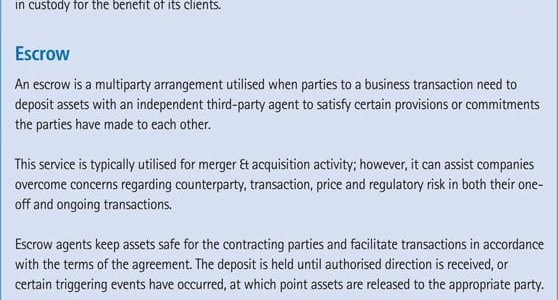by Thomas D. Avazian, Global Banking and Markets Product Executive, Bank of America Merrill Lynch
In the aftermath of the financial crisis, corporations and the banks that serve them have built up increasingly large cash reserves that have recently risen to record historical levels. As a result, companies have been looking at how these positions can best be managed, with a particular focus on counterparty risk and the need for real-time information on cash and securities holdings. The integration of cash management, custody, escrow and foreign exchange-related services have become more widely accepted as standard best practices to help ensure the integrity, security and real-time visibility of these critical functions.
Like many areas of corporate and transaction banking, cash management, custody, escrow and foreign exchange services have been on a lengthy trend of integrating across functional and service platforms. This process was greatly accelerated, however, due to the financial crisis following the collapse of Lehman Brothers in 2008. This crisis produced not only concerns about counterparty risk but also caused companies to further build out large cash positions to cushion themselves against any potential future financial shocks. These factors led to many treasury and finance areas diversifying their portfolios, spreading the risks across multiple counterparties, currencies and instruments, and multiple time zones which has led to more complex reporting and management needs.
Once upon a time, treasury management, custody of securities, escrow, foreign exchange and other services were very much managed in silos both by companies and by the banks that serviced them. Due to the factors mentioned above, the ability to manage all of this important and complex information has become extremely time consuming and difficult — and if not done correctly, can lead to the impairment of the financial condition of a company and even create real losses affecting performance. Therefore, there has been a trend fueled both by the need of corporations in this new and developing environment and the desire of global financial institutions to provide these services.
Examples of this abound, but certainly the variety of cash and securities holdings of companies around the world is one of the more complex aspects of this continuum. A global multinational corporation may hold US Treasury bills in New York, Eurobonds in London, RMB cash deposits in Shanghai and short-term CDs in Sao Paulo. All of these liquid cash holdings can have different reporting formats, settlement processes, banking intermediaries and a host of other complexities that the corporate treasurer sitting in the head office needs to know, understand, and decide on every single day across multiple time zones. Add event-driven flows related to mergers and acquisitions that require large, timed and complex payments, and you can see how even the simplest transaction can be an execution nightmare.
Sign up for free to read the full article
Register Login with LinkedInAlready have an account?
Login
Download our Free Treasury App for mobile and tablet to read articles – no log in required.
Download Version Download Version


























